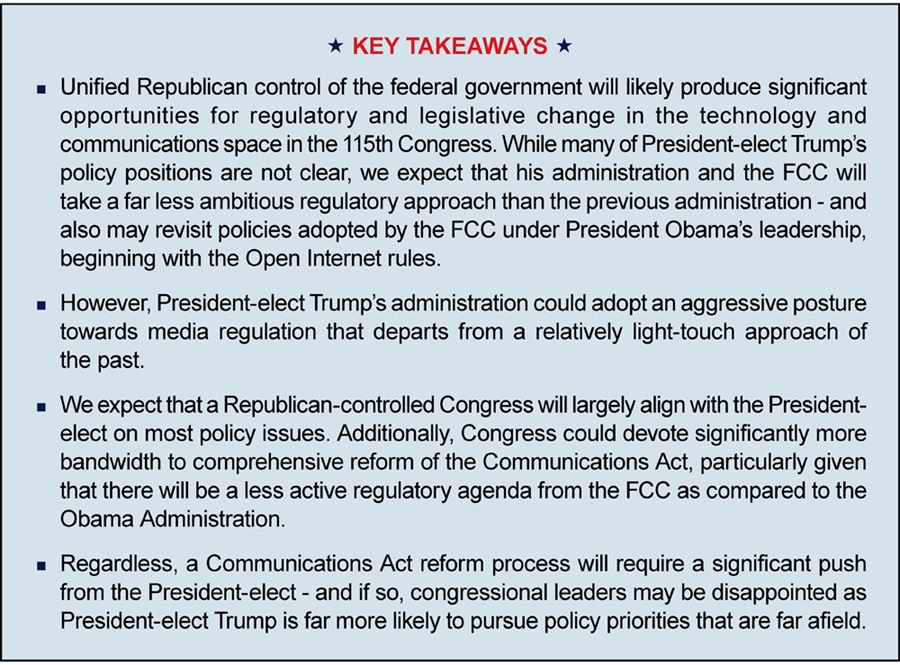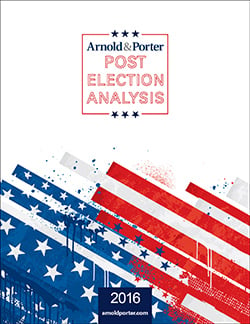Post-Election Analysis 2016: Technology & Communications

ADMINISTRATION PRIORITIES
Unlike Secretary Clinton's technology platform, which is well established and published in detail on both the candidate's website and through the Democratic National Committee's platform, little is known regarding President-elect Trump's technology and communications policy priorities. Regardless, the Republican National Committee (RNC) platform and statements from the President-elect suggest that as president, President-elect Trump will attempt to transform the US government into a partner with the private sector, not an aggressive regulator. President-elect Trump's administration will seek to facilitate access to spectrum and pave "the way for next generation broadband deployment and competition on the Internet for internet services." His administration will also encourage the sharing economy, create a hospitable environment for the Internet of Things (IoT) to thrive, and encourage public-private partnerships to provide rural Americans with reliable broadband Internet connections. In addition, there is at least a chance that a Trump Administration-led Federal Communications Commission (FCC) could take a more hands-on approach towards media regulation. During the campaign, the President-elect did, after all, suggest that his Administration would "open up those libel laws" when criticizing media criticism of his campaign, and President-elect Trump may find it irresistible to make life difficult on media operations he believes were biased against him in the campaign. It is therefore reasonable to assume that the Commission could become more active in media regulation as well.
Open Internet Policy Change. While President-elect Trump did not publish an official policy position regarding the FCC Open Internet rules as a candidate, he has a history of attacking the FCC's regulatory actions and President Obama's encouragement of the Title II common carrier reclassification approach. As a private citizen, Mr. Trump once tweeted: "[President] Obama's attack on the internet is another top down power grab. Net neutrality is the Fairness Doctrine. Will target conservative media." As a consequence, we expect that President-electTrump will appoint a chairman to run the FCC who is committed to reversing the FCC's reclassification of Broadband Internet Access Service (BIAS) as a precondition of service.
FCC Regulatory Approach. In general, under an FCC that is run by a President-elect Trump-appointed nominee, the Commission will likely recede from Chairman Wheeler's ambitious regulatory agenda and serve as a "cop on the beat," as opposed to an advocate for specific policy changes. This regulatory posture will appeal to congressional Republican leaders who openly crave a less-aggressive FCC that, in their view, should be focused on enforcing clearly established existing rules rather than pressing the boundaries of the agency's statutory authority. Such a shift could reverse the Commission's current regulatory trajectory, with the possible exception of aggressive enforcement and policymaking in the media space.
Infrastructure Policy. The President-elect's campaign team made a subtle, but potentially significant, addition to the campaign's infrastructure policy during the wee hours of the night between November 8th and 9th. The President-elect's infrastructure policy now includes a commitment to invest in "transportation, … telecommunications, security infrastructure, and other pressing domestic infrastructure needs," in an effort to create "thousands of new jobs in construction, steel manufacturing, and other sectors." While very few details exist supporting this big-picture commitment, the campaign's insertion of the term "telecommunications" into the campaign's vision for infrastructure policy is noteworthy.
AGENCY LEADERSHIP
President-elect Trump's transition team remains a work in progress, but there is a growing team devoted to technology and communications policy under the leadership of Jeffrey Eisenach, the former president and chief executive officer of the Progress and Freedom Foundation and fellow at the American Enterprise Institute. Mr. Eisenach is an outspoken opponent of the current FCC leadership's policy agenda, and he has a long history of advocating for free-market oriented communication and technology policy. Under a Trump Administration, the following individuals could be in line for senior-level positions in the administration or at the FCC:
- Ajit Pai, a current commissioner of the FCC and former Senate Republican policy advisor and attorney.
- Jeffrey Eisenach, a visiting scholar and director of the Center for Internet, Communications, and Technology Policy at the American Enterprise Institute.
CONGRESSIONAL LEADERSHIP
House. In light of Republican term limits that prevent Rep. Fred Upton (R-MI) from continuing to serve as chair of the House Energy and Commerce Committee, the role of chair will be awarded to one of three committee members who have expressed interest in leading the full committee: (1) National Republican Congressional Committee (NRCC) Chair Greg Walden (R-OR); (2) Rep. John Shimkus (R-IL); and (3) Chairman Emeritus Joe Barton (RTX), who chaired the committee from 2004 to 2007. Rep. Frank Pallone (D-NJ) is expected to continue to serve as ranking member. The transition at the top of the dais also could result in a new leader of the Subcommittee on Communications and Technology because current chair Rep. Walden will either move on to chair the full committee, or will give up the subcommittee gavel at the end of his six-year term unless he secures a waiver.
Senate. Sen. John Thune (R-SD) will retain his position as Chairman of the Senate Commerce, Science, and Transportation Committee. Sen. Bill Nelson (D-FL) will stay on as ranking member.
CONGRESSIONAL PRIORITIES
In the 115th Congress, we expect that Congress will continue to develop bipartisan legislation that seeks to balance the advancement of innovative technology with consumer privacy and security concerns. With a Republican Congress and White House, Congress may take a more aggressive posture towards legacy regulatory priorities from President Obama's administration. Nevertheless, the 115th Congress will likely prioritize many of the same technology legislative issues as in the last Congress, as President-elect Trump has given very little indication that his legislative priorities in the technology space depart radically from existing Republican efforts to ensure a light-touch regulatory environment.
To that end, it is certainly possible that Republican congressional leaders could move quickly to amend the Communications Act or otherwise block the Open Internet rules if judicial review does not do so first. While securing a veto-proof majority in the Senate will be a challenging undertaking, Republican leaders could seek a number of legislative vehicles, including through the appropriations process, to limit the Commission's authority in this area.
The work of the House Energy and Commerce Committee and Senate Commerce, Science, and Transportation Committee will be marked by continued oversight of the FCC and its regulations. We also are likely to see continued efforts to advocate for comprehensive telecommunications reform, building off of the House's work in the 114th Congress to build a body of comments on the record about the need for comprehensive reform. While there are some members of Congress that are interested in this type of reform, it is a large undertaking that may not be possible without some buy-in from President-elect Trump. We expect any technology-related work will begin in earnest in early 2017, as significant progress on these issues during the lame-duck session is unlikely.
FCC Transparency. Republicans remain interested in making FCC procedures more transparent by changing the reporting and information sharing requirements that the FCC must follow. Sen. Dean Heller (R-NV) could reintroduce legislation similar to his bill – the Federal Communications Commission Process Reform Act – again next year. That legislation made it through the Senate Commerce, Science, and Transportation Committee in April 2016 but never made it to the Senate floor. In an effort led by Rep. Walden, the House voted unanimously to pass a similar legislative package in September 2016 that would update the FCC's procedures and require additional transparency measures. These bills are likely to be reintroduced and considered in the 115th Congress, and we also expect Sen. Thune will continue the work he started in the 114th Congress to pass a full FCC reauthorization bill.
Net Neutrality. In light of President-elect Trump's criticism of the FCC's rules on net neutrality, we are likely to see renewed efforts in Congress to prevent the FCC's implementation and enforcement of the Open Internet Order. These legislative efforts may echo the proposal that Sen. Thune and Rep. Upton introduced in the 114th Congress that would limit the FCC's authority to implement the net neutrality rules.
Cybersecurity. Given the increased attention paid to cybersecurity during the election cycle, Congress is likely to continue its efforts to conduct oversight of the federal government's cybersecurity programs and initiatives. Cybersecurity policy is a traditionally bipartisan topic, with dividing lines drawn around policy perspectives and not necessarily partisan affiliation. For that reason, it is possible Congress may advance legislation to update cybersecurity standards for the federal government and provide more resources to protect networks from cyber attacks. We also expect that encryption policy will continue to draw congressional attention as the US government grapples to balance consumer privacy with the need to provide law enforcement agencies with access to information for national security purposes. Sen. Mark Warner (D-VA) and Rep. Michael McCaul (R-TX) could reintroduce legislation to create a national commission to study encryption, and members of Congress will continue to debate the role that Congress should play in the debate on the merits of encryption. We also expect Congress to reintroduce data security legislation, including renewed efforts to create a uniform, federal data breach standard that could streamline the existing patchwork of requirements across all 50 states.
Internet of Things. Members of the House Energy and Commerce Committee and the Senate Commerce, Science, and Transportation Committee will continue working to define the federal government's role in IoT as more devices and consumer appliances are connected to the Internet. Given the continuous expansion of IoT technologies, multiple agencies now have a stake in IoT policy and the potential for congressional oversight continues to grow. In the 114th Congress, members created a new bipartisan Congressional Caucus on IoT and a new bipartisan working group inside the House Energy and Commerce Committee. Both focus on IoT education and policy development. Additionally, both chambers passed resolutions related to the need for a national strategy for the IoT to promote economic growth and consumer empowerment. Though Congress started conversations about IoT in the 114th Congress, there is much work to be done. Policymakers in the next Congress will be faced with the task of developing a strategic plan and addressing other IoT challenges, such as inadequate funding and workforce capabilities, aging infrastructure, privacy and security concerns, and the rapidly evolving nature of the technology itself.
As Congress works on developing legislation addressing IoT, including the Developing Innovation and Growing the Internet of Things (DIGIT) Act (H.R. 5117), we expect policymakers will continue to engage with and rely on IoT industry leaders as trusted partners and resources.
Drones. Though the Federal Aviation Administration (FA A) has overseen the vast majority of recent policymaking related to drones, Congress included unmanned aerial systems (UAS) provisions in the most recent short-term extension of legislation to authorize FAA programs and is expected to revisit these issues in the 115th Congress. In July 2016, Congress passed a short-term reauthorization bill, extending FAA's regulatory authority until September 2017. While transportation leaders in the House and Senate praised the passage of the extension bill, many members were disappointed that the House and Senate could not reach an agreement on a full authorization bill this year. The small drone provisions included in the bill focused on improving safety and promoting further research. We expect the next FAA reauthorization bill to expand on these provisions and consider additional language on other UAS issues members could not agree on in the short-term reauthorization bill.
Our full analysis of the 2016 election is available below.



